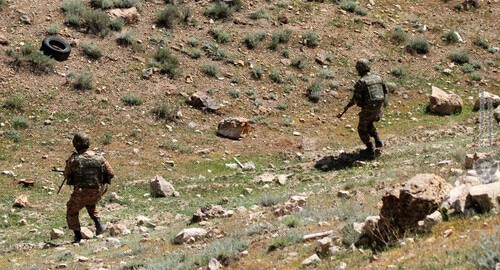
14 May 2021, 11:41
Baku military experts dispute about reasons for situation aggravation on Armenian border
The Azerbaijani experts interviewed by the "Caucasian Knot" correspondent have commented on the situation around the Syunik Region, while their opinions on Baku's intentions were different.
The "Caucasian Knot" has reported that on May 12, Azerbaijani militaries advanced three kilometres deep into the Syunik Region of Armenia and, according to the administration of the city of Goris, tried to gain a foothold in the area of Black Lake. The next day, the Azerbaijani militaries again tried to advance deep into the Syunik Region, but were stopped, the Armenian Ministry of Defence (MoD) has informed.
This is a standard procedure for border demarcation, said Natig Djafarli, the head of the "Respublika" Centre for Economic Studies. "It's about clarifying the border according to the maps of the USSR Ministry of Defence of the 1970s. There is Lake Karagol (also called "Black Lake" – note of the "Caucasian Knot"). In Soviet times, the border ran across the middle of the lake. Today, Azerbaijan demands a return to the Soviet situation, while Armenia believes that the entire lake is within its jurisdiction. The disputes are precisely about clarifying the border. A few days ago, the Azerbaijani party turned to the Russian peacemakers and the Armenian counterpart to clarify the border at Lake Karagol. No answers have been received; therefore they simply moved their posts so that to comply with the maps of the 1970s," Mr Djafarli told the "Caucasian Knot" correspondent.
Eldar Namazov, a political analyst and the head of the Centre for International and Strategic Studies, believes that the recent developments are the tools to put pressure on Armenia. He recalled that in the 1920s, when the Armenian-Azerbaijani demarcation was undertaken, a "package agreement" was concluded on the fate of Karabakh and Zangezur (as Syunik was called then). "The situation was resolved through a compromise – the mountainous part of Karabakh remained within Azerbaijan as autonomy, while Zangezur became a part of Armenia," the expert said. When in the 1980s Armenia violated the agreement and wanted to annex Karabakh, this affected not only Karabakh, but also Zangezur. "Since Armenia, despite the triple agreement concluded last November, has not yet withdrawn its troops from Karabakh, Azerbaijani troops can enter Zangezur. The sooner the Armenian leadership signs a peace treaty recognizing each other's territorial integrity, the better," Mr Namazov has suggested.
This article was originally published on the Russian page of 24/7 Internet agency ‘Caucasian Knot’ on May 14, 2021 at 05:14 am MSK. To access the full text of the article, click here.
Author: Semyon Charny Source: CK correspondent




